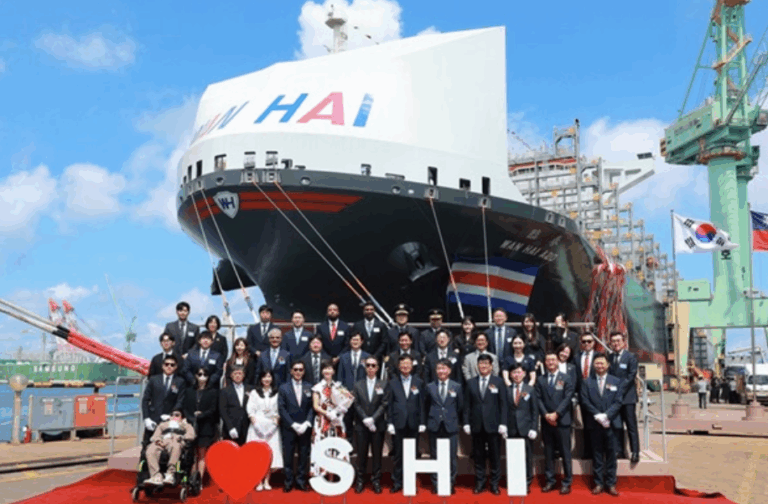On August 14, Taiwan-based shipowner Wan Hai Lines held a naming ceremony for its environmentally friendly 13,000TEU Neo-Panamax container ship “WAN HAI A20” at Samsung Heavy Industries.

The “WAN HAI A20” is the last of the 13 13,100TEU series container ships ordered by Wan Hai Lines from Samsung Heavy Industries between 2021 and 2022. After delivery, it will be deployed on Wan Hai Lines’ Asia-South America (West Coast) “ASA” route.
The series of container ships are 335 meters long, 51 meters wide, with a maximum draft of 16 meters and a design speed of up to 22 knots. The new ships are equipped with nitrogen oxide reduction systems (SCR) and ballast water treatment systems (BWTS), as well as various energy-saving devices and SVESSEL intelligent ship solutions.
This series of container ships are built as environmentally friendly smart ships and have obtained “smart shipnotation” certification. They can use various monitoring systems and communication equipment to collect real-time data on ship navigation and equipment operation, enabling economical and safe operation, reducing resistance during navigation, saving energy, and reducing fuel consumption.
The environmental performance of this series of container ships has been enhanced through the use of newly designed engines, which is expected to reduce energy consumption (i.e., fuel consumption). In addition, the last three ships in the series, the WAN HAI A18, WAN HAI A19, and WAN HAI A20, have been fitted with bow wind deflectors, which is expected to further reduce fuel consumption.
With the delivery of the entire 13,100 TEU series of container ships, Wan Hai Lines plans to receive another 30 newly built ships in the coming years, with delivery expected between 2026 and 2030.
Wan Hai Lines placed its most recent order in April this year, announcing that it had ordered two 16,000 TEU methanol-ready container ships from Samsung Heavy Industries and HD Hyundai Samho Heavy Industries.
Alpha Liner data shows that Wan Hai Lines’ 30 new ships have a capacity of 317,716 TEUs, and it currently has a fleet consisting of 110 owned ships (519,300 TEUs) and 2 chartered ships (4,396 TEUs).


